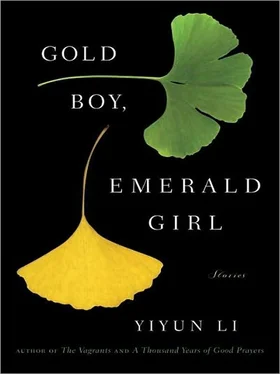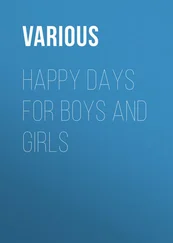“Why are you unhappy?” Lieutenant Wei said when I did not speak. Placing a finger under my chin, she lifted my face slightly toward the moon. “Tell me, how can we make you happy?”
I now know that it was out of innocent confidence that Lieutenant Wei asked those questions. She was twenty-four then, a sensible and happy person. There are people, I now know, who have been granted happiness as their birthright, and who, believing that every mystery in life can be solved and every pain salved, reach out with a savior’s hand. I wish I had replied differently, but at eighteen, I was as blind to her kindness as she was to my revulsion at any gesture of affection. “Why don’t you give me a happiness drill right at this moment?” I said. “There is nothing we can’t achieve in the army, isn’t that right, Lieutenant?”
The rainy season began the next day, and it rained on and off for the rest of our journey. The mountain road was muddy, and the bedrolls on our backs, despite our heavy raincoats, inevitably got damper each day, “good for nothing but cultivating mushrooms,” as Nan drily observed one night. Wildflowers by the roadside drooped in the storms, but even if they had not, we would not have regained the impulse to decorate our buttonholes with them. The officers stopped ordering us to sing, and sometimes we walked for an hour or two without talking, the only noise coming from the rustling of our raincoats, the rain falling on the tree leaves, and our footsteps in the soft mud.
I avoided Lieutenant Wei as much as she avoided me, though strangely, when we sat down in an open field at breaks, I would watch the rain fall off my visor, and hope for the chance to talk to her again. Stop being an idiot, I scolded myself; still, I found myself involuntarily searching for her when we set up camp in the evenings.
The rain stopped on May Day, and the sky lit up, the purest blue I had ever seen. We ended the marching early, at midday, and stationed ourselves in a place called Da-Wu —nirvana —an unusual name for an impoverished mountain town. There were only two days left in our journey, but before we returned to the camp, there was to be a field exercise that night. Da-Wu, once a model town, which had spent more than it could afford building intricate air-raid shelters and tunnels outside of town as preparation for the Sino-Soviet war, provided the perfect site.
We set out at eight, the third platoon to use the training site. On the way there we met the other platoon of girls, marching and singing as if returning from a most exhilarating game. The assignment was simple — two squads were to face each other in a meeting engagement, and the squad leaders were to lead their soldiers to annihilate the enemies. Each of us got two rounds of ten blanks, and when we reached the entrance to a network of tunnels, Lieutenant Wei whistled, the signal to begin.
The musty tunnel, unused but by the most adventurous children perhaps, smelled sulfuric from the encounters of the previous platoons. We stumbled our way through, the flashlight of the squad leader the only light. Someone giggled when she bumped into the person ahead of her, and Ping, in a loud whisper, wondered if there were rats or bats rushing to find shelter from us. It was as if we were returned to our childhood for a war game in the schoolyard, and the machine guns only added to the excitement, since as children the most we could do was use a tree branch as a weapon, or shape our hands into pistols.
After fifteen minutes, we exited the tunnel and stepped into a long trench. Across the dark field we heard rustling, so our squad leader ordered us to find shooting positions in the trench. No more than five minutes later we had emptied our rounds of ammunition into the emptiness between us and our enemies, the metallic explosions shrieking in our ears and lighting up the field just long enough for us to see the smoke dispersing. What a fun game! a girl shouted before she fired the last bullet. There was clapping on the other side of the battleground in reply.
When we gathered again, Lieutenant Wei asked us to report on the battle. I killed ten and injured five, Ping yelled out, and soon it became a boisterous competition. When the clamor quieted down, Lieutenant Wei said let me show you something, and led the platoon down a different road back to town.
We stopped at a trench on the other side of the battleground. Hundreds, perhaps thousands of fireflies twinkled, lighting up the tall, slender grasses in the trench. No one spoke. We had killed as many times as we had been killed, yet we had never been as alive as we were on that beautiful night in May.
“In memory of tonight, I’m going to ask someone to sing a song for us,” Lieutenant Wei said. Many girls turned to Nan, and she handed her machine gun to the girl standing next to her. Lieutenant Wei shook her head at Nan and turned to me. “Can you sing a song for the platoon?”
I could not read Lieutenant Wei’s face. “I’m not good at singing, Lieutenant,” I replied.
“That is not a problem for us,” Lieutenant Wei said. “All we need is for you to step up and sing.”
Some of the girls gazed at me sympathetically, others were perplexed. They must have been wondering what wrong I’d committed to earn myself this punishment. When I still did not move, Lieutenant Wei raised her voice and ordered me to step out of the formation, her voice no longer patient.
At eighteen I entered the army fresh and young, and the fire-red stars on my epaulets shone onto my blossoming youth , I sang flatly. It was the first marching song we had been taught back in the fall. Lieutenant Wei ordered me to stop. “Sing us a civilian song,” she said.
“I don’t know any civilian songs, Lieutenant.”
“Do you need me to find someone to teach you a song at this very moment, Comrade Moyan?” Lieutenant Wei said.
“I am a slow learner, Lieutenant.”
“There is nothing we can’t achieve in the army,” Lieutenant Wei said. “We’ll stay here all night waiting for you to learn a song and sing it for us, if that has to be the case.”
When I began to sing again there was a ripple of unease. “It Is a Shame to Be a Lonely Person” was the song, called by Major Tang the product of a corrupt and lost generation. Halfway through I saw Jie roll her eyes, unimpressed by my foolish stubbornness; Nan watched me, puzzled. What would Professor Shan have said if she had seen me then, singing and crying in front of people who deserved neither my song nor my tears? One’s fate is determined by what she is not allowed to have, rather than what she possesses: Professor Shan’s words came to me then, her only comment after reading me a Lawrence story called “The Fox.”
ELEVEN
A MILITARY JEEP was waiting for me when we returned to the meeting hall where we had set up camp for the night. Major Tang, who was exchanging small talk with the driver, informed me that I was to leave immediately for the train station at the county seat. Three hours earlier a telegram had arrived at the camp, which the driver now produced from his pocket, the thin green slip of paper smelling of cigarette smoke. Mother passed away please return , sent by someone whose name I did not recognize. My father, unable to leave my mother alone, must have sent someone to the post office in his place. I imagined the stranger spelling out the message; when words of condolence were offered he must have said, thank heaven it was not his daughter who would be getting the telegram.
I brought only my satchel with me. There was no time to say farewell to anyone, as the driver had orders to make sure I caught the last night train to Beijing. We arrived just as the train was leaving the station, so the driver, ignoring my suggestion that I could spend the night in the station and catch the first train in the morning, sped down a country road that for the most part ran parallel to the train tracks until his Jeep overtook the puffing engine. At the next station, a small one with neither a waiting area nor a ticket booth, the driver insisted on waiting with me and seeing me board the train safely. The only other passenger on the platform was a dozing old man, leaning on a thick tree branch he used as a walking stick; at his feet were two heavy nylon bags and a bamboo basket. He stirred when he heard our steps. The driver asked him where he was going, but the old man, not understanding the question or perhaps too deaf to hear it, mumbled something in some local dialect before dozing off again. Soon the train arrived, and the driver helped the old man up the steps and then passed him his bags. I went for the basket, and only then did I discover the small child, wrapped in an old blanket and sleeping inside, one finger curled under her smiling face.
Читать дальше
Конец ознакомительного отрывка
Купить книгу












